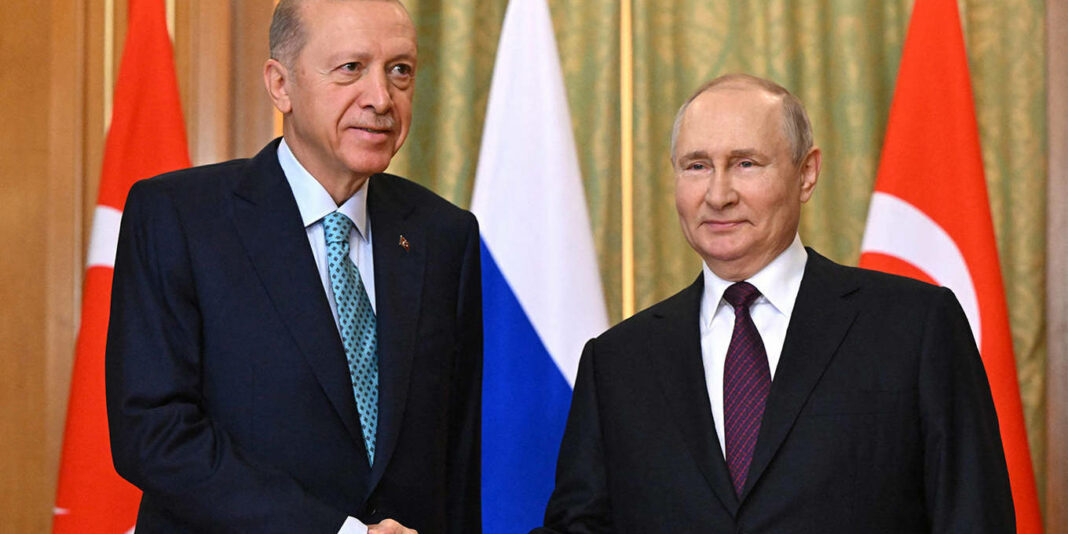PROJECT SYNDICATE, 28 OCTOBER 2025
In today’s increasingly multipolar world, the rise of geopolitical conflicts has been a boon for competitive authoritarian regimes. Russia’s war against Ukraine, for example, strengthened the domestic positions of Hungarian Prime Minister Viktor Orbán and Turkish President Recep Tayyip Erdoğan ahead of pivotal elections.
ISTANBUL – US President Donald Trump’s ferocious assault on American institutions over the last nine months is a particularly morbid symptom of the global decline of democracy. But Trump has merely capitalized on a process that was well underway before his return to the White House.Several factors have contributed to this worldwide retreat.Authoritarian regimes consolidated power by sharpening their methods of control, from electoral engineering and digital surveillance to legal and institutional manipulation. Moreover, autocrats often provide each other with political and economic support, as demonstrated by the close ties between Chinese President Xi Jinping and Russian President Vladimir Putin. And the shortcomings of several high-profile democracies – not least the United States – have arguably made the model less attractive.
But what is often overlooked is how profound changes to the international order have reinforced authoritarian regimes. In today’s increasingly multipolar world, the rise of regional geopolitical conflicts has been a boon for competitive authoritarian systems, which hold elections but tilt the political playing field in their favor.
A prime example is Russia’s war of aggression in Ukraine, which helped boost the domestic legitimacy of Hungarian Prime Minister Viktor Orbán and Turkish President Recep Tayyip Erdoğan in the run-up to pivotal elections.
Russia’s invasion of Ukraine came just over a month before Hungary’s parliamentary election on April 3, 2022. Orbán hammered home the message that only he could keep Hungary safe. Unlike the opposition, whom Orbán portrayed as reckless warmongers for wanting to support Ukraine’s defense, he promised to shield Hungarians from war. Bombarded by pro-government media, many Hungarians came to see Orbán as the guarantor of peace – even opposition supporters feared that a change of government might drag Hungary into the conflict.
Orbán also leveraged the war in Brussels, threatening to block European Union efforts to help Ukraine unless the European Commission released frozen funds for Hungary. At home, he framed this as a triumph over European elites eager to spend “Hungarian money on Ukrainians.” Pro-government media echoed the Kremlin narrative, blaming EU sanctions – not Russia’s invasion – for Hungary’s economic troubles, and framed Orbán’s long-standing ties with Putin as proof of his ability to secure cheap energy, whereas electing the opposition could mean shortages. Orbán’s Fidesz-led coalition won two-thirds of the seats, retaining its parliamentary supermajority and consolidating his grip on power.
Similar dynamics played out in Turkey. In the run-up to the presidential election in May 2023, Erdoğan emphasized his personal diplomacy in the Ukraine war, highlighting the Black Sea grain deal. Facing off against a single challenger supported by a broad opposition alliance, Erdoğan also cast himself as the only leader capable of keeping Turkey out of the conflict while also elevating its global influence. Pro-government media warned that an opposition victory would mean full alignment with the West’s war effort. The race was tight and required a runoff, but Erdoğan prevailed.
Economically, Erdoğan exploited Turkey’s refusal to adopt Western sanctions: trade with Russia surged; Russian tourists and firms arrived in the country with cash to spend; and the Kremlin allowed Turkey to defer millions of dollars in gas payments. In 2022, Russia’s state nuclear-energy corporation transferred $15 billion to a subsidiary in Turkey to ensure the continued construction of the Akkuyu nuclear power plant – which was inaugurated just a few weeks before the election. All this helped ease the economic pressures stemming from Erdoğan’s unorthodox policies and enabled him to portray himself as indispensable to Turkey’s prosperity.
Moreover, Turkish-made drones on the Ukrainian battlefield were held up as symbols of national pride and technological prowess. As Turkey’s top defense export, these cheap and deadly drones have been central to its foreign-policy narrative, as has another military achievement that Erdoğan touted during the 2023 election campaign: the country’s first amphibious assault ship built to carry drones and helicopters.
This spotlight on defense predates the Ukraine war. Turkey’s military support for Azerbaijan in the 2020 Nagorno-Karabakh war (which included the deployment of drones) was widely publicized and also boosted Erdoğan’s domestic legitimacy.
Political developments in Hungary and Turkey in the wake of Russia’s full-scale invasion of Ukraine hold three lessons. First, international crises do not necessarily expose an authoritarian regime’s vulnerabilities; they can just as easily create opportunities to consolidate power, marginalize opponents, and secure outside backing.
Second, public attitudes are important: The absence of strong anti-Russian sentiment in both Hungary and Turkey allowed Orbán and Erdoğan, respectively, to frame cooperation with the Kremlin as pragmatic rather than traitorous. When public opinion is divided, authoritarian incumbents can more easily manipulate crises to their advantage.
Lastly, the actors involved in regional geopolitical conflicts matter. Putin’s willingness to provide economic concessions, financial transfers, and propaganda support helped Orbán and Erdoğan weather domestic challenges.
Hungary and Turkey serve as reminders that evolving global dynamics can influence the survival of competitive authoritarian regimes. As the world shifts toward multipolarity, and middle powers gain greater influence, regional conflicts will probably multiply. If the shockwaves from the Ukraine war are any indicator, these crises are more likely to strengthen autocrats than to weaken them.
Senem Aydın-Düzgit is Professor of International Relations at Sabancı University and Director of the Istanbul Policy Center.

